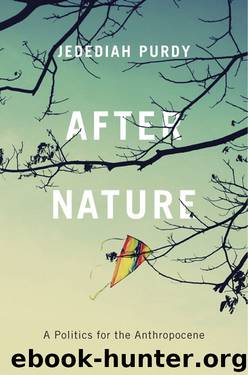After Nature: A Politics for the Anthropocene by Jedediah Purdy

Author:Jedediah Purdy [Purdy, Jedediah]
Language: eng
Format: epub
ISBN: 9780674368224
Publisher: Harvard University Press
Published: 2015-08-31T18:30:00+00:00
The Roots of Conservation
Building stronger states and shaping governance through science were great themes of the later nineteenth century on both sides of the Atlantic. American reformers owed much to European administrators who pioneered the welfare state, to political economists who described society as an organic whole rather than a constellation formed of self-reliant individuals, and to the foresters who developed silviculture as their countries’ woodlands dwindled. (France’s central government had been wrestling with its regional authorities over forest management since the seventeenth century; the young Gifford Pinchot absorbed some of the lessons of this experience in a year he spent studying at the National School of Forestry in Nancy.) These were decades of intense transatlantic influence around new problems that were pressing on all the industrialized countries.
The American version of conservation was indebted, especially, to the work of George Perkins Marsh, whom we met in Chapter 4. His 1864 book Man and Nature is often described as a precursor of ecological science and environmental policy—but in truth, it is stranger and more distinctive than that. Marsh brought together two literatures and combined them with his own New England moralism to enlist the natural world in a campaign of managerial reform. Marsh drew on the natural histories of the Comte de Buffon and Alexander von Humboldt, who had blended empirical inquiry with philosophical speculation about how nature’s order arose and changed. He also continued a literature of jeremiads against resource exhaustion that went back to England’s Civil War–era forester, the Royalist John Evelyn, and his contemporary Jean-Baptiste Colbert in France. Marsh imbibed these European influences as a polylingual traveler who, among other excursions, logged a period as U.S. ambassador to Italy. The distinctly American element in his work was a Protestant and republican moralism in which nature’s health, and the survival of the human species, formed a judgment on the country’s intelligence, discipline, and public spirit.
In a diagnosis that was both environmental and moral, Marsh denounced “the ravages committed by man [that] subvert the relations and destroy the balance which nature had established,” leaving “well-wooded and humid hills … turned to ridges of dry rock.” He warned that “human crime and human improvidence” might bring the planet to “such a condition of impoverished productiveness, of shattered surface, of climatic excess, as to threaten the depravation, barbarism, and perhaps even extinction of the species.”40 On one level, this passage expresses Marsh’s proto-ecological theory, which was that nature tends toward stability and that disruptive human action sets off a spiral of breakdown. On another level, the energy of the passage is moral and polemical. Marsh describes ecological change as driven by criminal and profligate behavior. If humanity went extinct from resource exhaustion, we would deserve it.
Marsh’s footnotes gave running commentary on the political morality of his ecological argument. He footnoted the passage just quoted with bits of a sermon by the Protestant divine James Martineau: “By relaxing … [the world] tend[s] downwards, through inverted steps, to wildness and the waste again. Let
Download
This site does not store any files on its server. We only index and link to content provided by other sites. Please contact the content providers to delete copyright contents if any and email us, we'll remove relevant links or contents immediately.
The Lonely City by Olivia Laing(4112)
Animal Frequency by Melissa Alvarez(3750)
All Creatures Great and Small by James Herriot(3506)
Walking by Henry David Thoreau(3227)
Exit West by Mohsin Hamid(3173)
Origin Story: A Big History of Everything by David Christian(3133)
COSMOS by Carl Sagan(2944)
How to Read Water: Clues and Patterns from Puddles to the Sea (Natural Navigation) by Tristan Gooley(2849)
Hedgerow by John Wright(2771)
The Inner Life of Animals by Peter Wohlleben(2763)
Origin Story by David Christian(2677)
How to Read Nature by Tristan Gooley(2657)
Project Animal Farm: An Accidental Journey into the Secret World of Farming and the Truth About Our Food by Sonia Faruqi(2655)
How to Do Nothing by Jenny Odell(2640)
A Forest Journey by John Perlin(2584)
Water by Ian Miller(2579)
The Plant Messiah by Carlos Magdalena(2451)
A Wilder Time by William E. Glassley(2358)
Forests: A Very Short Introduction by Jaboury Ghazoul(2331)
